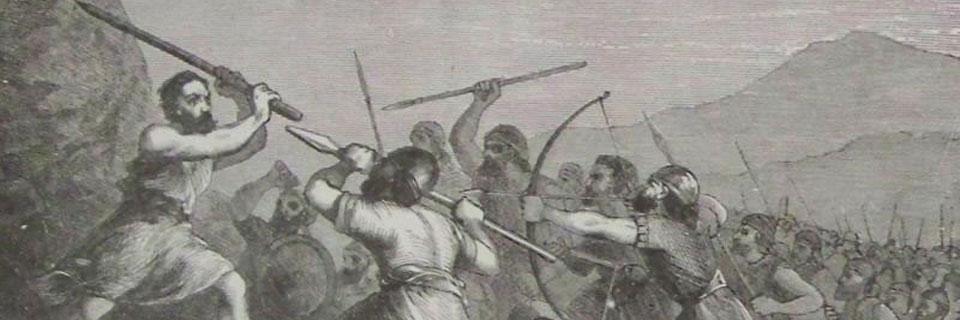Shamgar was the third judge of Israel after Ehud, and immediately before Barak. His name only mentioned in two Bible verses, and little is known concerning Shamgar ( Judges 3:31, Judges 5:6).
One verse of the Bible summarizes his period of leadership. Judges 3:31 says, “After Ehud came Shamgar son of Anath, who struck down six hundred Philistines with an oxgoad. He too saved Israel.”
We are only told that 1) Shamgar’s leadership followed Ehud’s, 2) he was the son of Anath, 3) he killed 600 Philistines with an oxgoad, and 4) he saved Israel.
Shamgar is probably a Naphtalite, as Beth Anath was of Naphtali. This tribe took a foremost part in the war with Jabin ( Judges 4:6; Judges 4:10; Judges 5:18). The tributary Canaanites ( Judges 1:33) combined with the Philistines against Israel, rendering the highways unsafe and forcing Israelite travelers into byways to escape notice. The villages were forsaken, and as in later times the oppressors disarmed Israel of all swords and spears ( Judges 4:3; 1 Samuel 13:19; 1 Samuel 13:22). With an ox goad, his only weapon (Compare Judges 15:15-16 , An Undesigned Coincidence Marking Genuineness; 1 Samuel 17:47 ; 1 Samuel 17:50 ; Spiritually 2 Corinthians 10:4 ; 1 Corinthians 1:27 ) he slew 600 Philistines, thereby giving Israel deliverance from oppressors for a time. So he prepared the way for Deborah and Barak’s more decisive blow. The inadequacy of the instrument renders Jehovah’s might the more evident.
1. It seems Israel needed deliverance, for he delivered Israel; how great the distress was Deborah afterwards related in her song (Jdg. 5:6), that in the days of Shamgar the highways were unoccupied, etc.; that part of the country which lay next to the Philistines was so infested with plunderers that people could not travel the roads in safety, but were in danger of being set upon and robbed, nor durst they dwell in the unguarded villages, but were forced to take shelter in the fortified cities.
2. God raised him up to deliver them, as it should seem, while Ehud was yet living, but superannuated. So inconsiderable were the enemies for number that it seems the killing of 600 of them amounted to a deliverance of Israel, and so many he slew with an ox-goad, or, as some read it, a plough-share.
It is probable that he was himself following the plough when the Philistines made an inroad upon the country to ravage it, and God put it into his heart to oppose them; the impulse being sudden and strong, and having neither sword nor spear to do execution with, he took the instrument that was next at hand, some of the tools of his plough, and with that killed so many hundred men and came off unhurt. See here,
(1.) That God can make those eminently serviceable to his glory and his church’s good whose extraction, education, and employment, are very mean and obscure. He that has the residue of the Spirit could, when he pleased, make ploughmen judges and generals, and fishermen apostles.
(2.) It is no matter how weak the weapon is if God direct and strengthen the arm. An ox-goad, when God pleases, shall do more than Goliath’s sword. And sometimes he chooses to work by such unlikely means, that the excellency of the power may appear to be of God.
